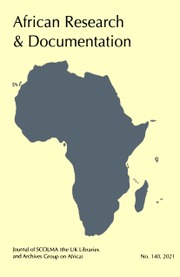Article contents
Printing in Onitsha: Some Personal Observations on the Production of Nigerian Market Literature
Published online by Cambridge University Press: 25 April 2022
Extract
I have always been very interested in “fringe” or “non-standard” publications. I was active in the “little magazine” movement in England in the sixties, publishing and collecting poetry from small presses. I now live in Brazil, where I avidly purchase the popular poetry pamphlets which are still sold on market stalls. It was natural, therefore, that when I was a lecturer in the Department of Library Science, Ahmadu Bello University, Zaria, Nigeria, in 1974-5, I should become interested in Onitsha market literature. I went to Onitsha twice, and visited publishers and printshops (I have had experience in setting type and working printing presses). I drafted a brief article on Onitsha publications, but other pressures prevented me from preparing it for the press. In 1983 I showed the draft to Miss Use Sternberg, responsible for African acquisitions in the British Library, Reference Division.
- Type
- Articles
- Information
- Copyright
- Copyright © International African Institute 1984
References
Notes
1. I no longer have anything like this number of pamphlets; most of my collection has been dispersed to libraries, while I retain only about fifteen titles, sufficient to illustrate a lecture or mount a small exhibition.
2. There is a photograph of the interior of a tpyical Onitsha bookshop on the cover of OJI, Gordian, Salami, R.A. & UMORU, Wallarri P. Learn to speak English, Hausa, Ibo and Yoruba languages. Onitsha, Gebo, n.d. 54p. The photograph has been captioned, humorously, “Learners of the four Nigerian main languages” and is, unfortunately, of such poor quality that it is impossible to reproduce.
3. Onwuka, C.C. The story of Arab-Israel war and other war stories. (Onitsha), Sept. 1973. 32p.Google Scholar
Eze, K.C. The great war between Israel and Arab and other war stories. Onitsha, Njuko, April 1974. 40p.Google Scholar
Onwuka deals with the 1967 war, and Eze the 1973 ,war, with totally different texts. The author of the “Trial of Hitler”, on the final leaves of both texts, is not specified; the style is reminiscent of that of Thomas Iguh, author of “The last days of Lumumba”, and other Onitsha pamphlets containing dramatic trial scenes.
- 1
- Cited by


